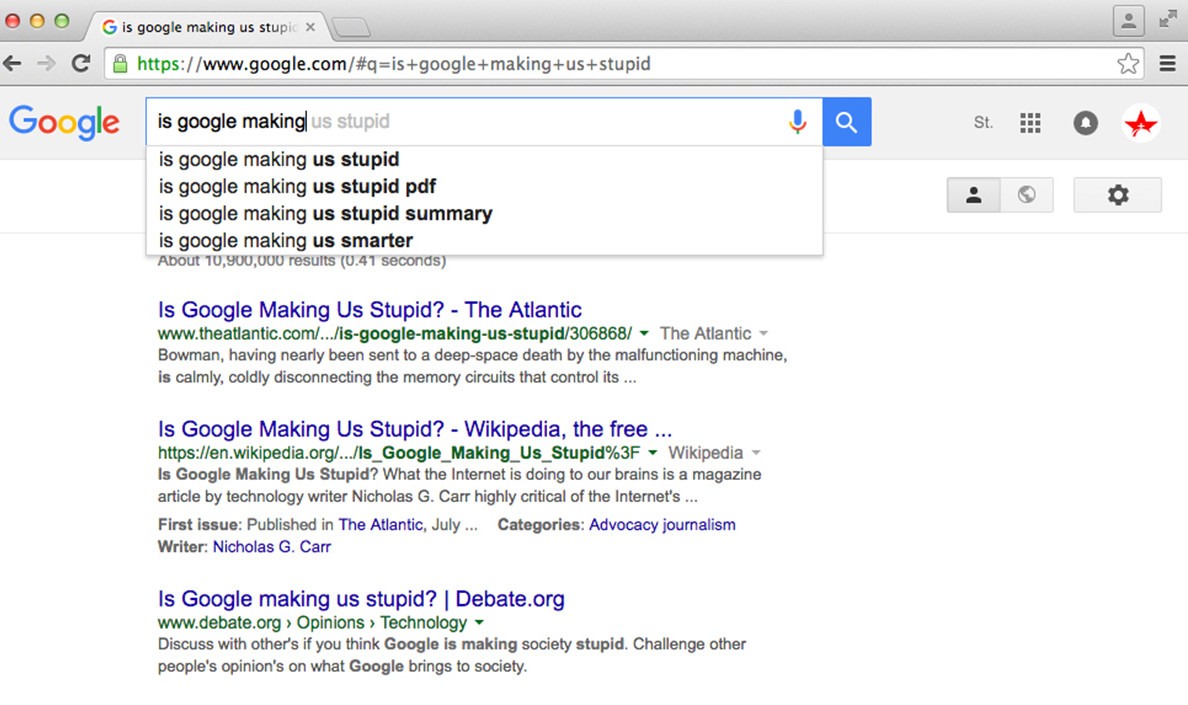Is Google Making Us Stupid? A Decade Later, the Question Still Matters
Editor’s Note: In 2008, Nichollas Carr published an article in The Atlantic posing the question “Is Google Making Us Stupid?” Today, Google is even more intimately woven into countless facets of society, from how we shop and search for information to how we connect with others – Google is even said to be developing driverless cars. The question may be more relevant now than it was a decade ago. We asked some of the University’s STEM faculty to weigh in.
“Let me Google it.” That seems to be the answer to most questions these days.
Questions like, “What was the name of the actress in that one thing?” or “How many quarters can you fit in a pickle jar,” and more and more frequently, questions asked in the classroom.
For its convenience, Google has become the go-to source for information leading to more than 40,000 search queries every second. Finding information has never been easier.
But this access to information comes with a shadow: articles have been popping up discussing the troubling trend of students typing homework questions and essay prompts into Google and simply turning in the results found on the first page.
But all this Googling begs the question, Is Google destroying our ability to think?
Google: A “Shortcut on Steroids”…Is It Undermining Critical Thinking in Education
Dr. Dominic Aquila, provost at the University of St. Thomas, attributes the rising trend, not to the convenience of Google, but to an impoverished view of education.
“Students can type a question into Google and not just get information, but get an answer,” Aquila said. “That is something that has always been available to students, just with greater immediacy now. Students used to use CliffsNotes as a sort of shortcut. Google is just a shortcut on steroids.”
That is to say that Google may give us the information we need, but it does not offer the ability to understand how to use that information. That is where learning to think critically comes in.
Critical thinking is considered a higher order level of thinking. In today’s day and age, information as raw content is more abundant and accessible than it has ever been before. Distinguishing what information is useful and important and applying it a task creates knowledge. That parsing of information is where critical thinking begins. Having knowledge and being able to use that knowledge to inform decisions is wisdom.
In the classroom these steps are achieved through Socratic dialogue.
“When you talk about a good professor, they know when a student gives them a CliffsNotes answer because it is formulaic and pre-fabricated,” Aquila said. “The student may be at a good starting point but a professor should ask them to think critically about the sources as well, questioning what they agree with and whether the source is credible, before developing an answer.”
Google in the Classroom: Teaching Students to Ask Better Questions
For Dr. Shivas Amin, assistant professor of bioinformatics, critical thinking isn’t only a matter of developing answers; it also requires you figure out what questions to ask.
“You can identify novices to a subject, because they don’t even know what questions to ask to illuminate the subject,” Amin said. “That is where critical thinking is important; you have to identify what you don’t know in order to ask the right questions.”
In that sense Google is merely a tool that allows people to express and enhance critical thinking skills. But like any tool, there is a learning curve.
“The majority of people who use Google are very bad at it,” Amin said. “What they do is put every single word in the text search, which convolutes the algorithms ability to give you what you want. You have to think critically about the search terms that you are going to use.
In the classroom, Amin and his students use Google on a regular basis. Amin encourages students to find ideas and thoughts they are interested in working on and apply it to the course material. As a result, the class encounters subjects they may not have seen before and quickly Google them to facilitate class discussion and understanding.
This is only possible because of the easy access to information that Google provides.
“At UST students are asked to create something, and to do that they need to have knowledge which no longer requires going to the library and reading book after book,” Amin said. “Students can find scholarly articles online and spend more time on ruminating, thinking and building new and exciting ideas.”
If Google Isn’t Bad, What is it?
“This is revolutionary,” Amin said. “We have a lot of information that we may have not been privy to and we have the ability to access it whenever we want. The ideas of man are being recorded for everybody to access.”
Google is changing the way information is stored, accessed and created, and it certainly has been great tool in the development and exploration in knowledge.
Whether we allow its convenience to debilitate us is completely up to us.
“Whenever you have a technological advance, part of the reflective moment is to assess what you gain and what are some of the detriments,” Aquila said. “That is thinking critically.”
By Darnell Miller
